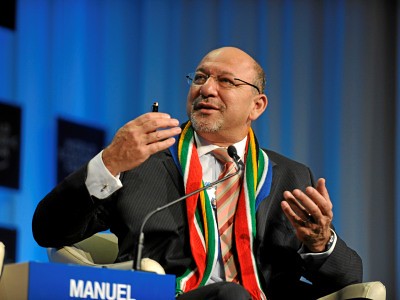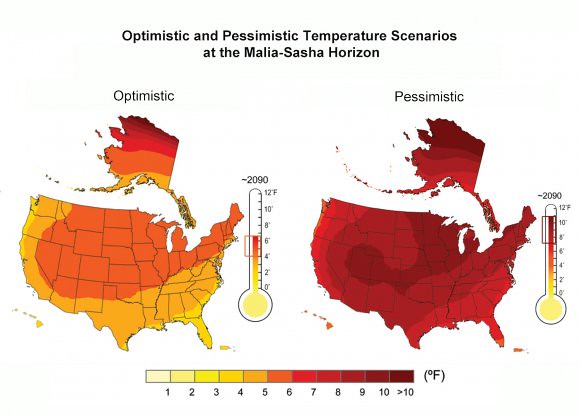 It's official. South Africa's neo-liberal politico, the World Bank flunky Trevor Manuel, will co-chair the 50-member committee to design the $100 billion Green Climate Fund!
It's official. South Africa's neo-liberal politico, the World Bank flunky Trevor Manuel, will co-chair the 50-member committee to design the $100 billion Green Climate Fund!
Talk about corruption of the UNFCCC process! Why, just last December in Cancun, the developing countries were assured that the World Bank would be taking a side seat in the administration and design of the Green Fund..... after all, the World Bank is notorious for its filthy financing of coal, oil and gas projects (some $6.6 billion in 2010).

Acceptable Losses: Which scenario do you anticipate now that the World Bank has such a stranglehold on the Green Climate Fund? Read The Malia-Sasha Horizon And the Cosmological Commons.
IOL, South Africa News Services, reports there is long-standing speculation that Manuel's real heart-throb is to serve as head hancho at either the World Bank or the IMF.
As the 2000 chair of both "THE Bank's and IMF's board of governors and of "The Bank's" 2001-2005 development committee, Manuel was also a special UN envoy to the 2002 summit in Monterrey on Financing for Development, served on the Commission for Africa, and was a chair of the 2007 G-20 summit.
Will be interesting to see how this appointment sits with the LDCs, SDISs and the Global Climate Justice Movement as the UNFCCC process winds its way towards Durban next winter. After all, opposition to the role of the World Bank in the GCF was vehement in Cancun, with over 100 diplomats signing an open letter to governments demanding the removal of the Bank from all future climate change architecture.
In a Bretton Woods Project article World Bank corners climate funds? authors discuss the ongoing activities of the World Bank in its launch of new carbon market initiatives, and its backing of the successful and highly controversial "Bank-housed Climate Investment Funds."
“[Having] directly experienced the consequences of [Bank] loans, loan-financed projects and policy conditionalities, to us, it is inconceivable that this institution can be entrusted with climate finance," said Abdul Awal of SUPRO, a network of grassroots community groups in Bangladesh and a member of Jubilee South.
Others such as Brussel-based NGO Eurodad highlighted that the Bank is unfit for a role in climate finance stating “The World Bank will deliver a significant part of climate finance as loans that will very likely come attached with conditionalities, advisory services and undermine recipient ownership of the funds. The World Bank's governance structures are undemocratic, with representation dominated by governments of rich, industrialised countries that will pursue their own commercial interests through the process." The group also drew attention to the Bank's privileging of the private sector.
Despite uproar about Bank involvement, an agreement to create a new Green Climate Fund (GCF) was reached, naming the Bank as interim trustee for the first three years. This role was hotly debated, with several negotiators from developing countries trying to define that role as narrowly as possible, and civil society groups speaking out against it. Tim Gore of international NGO Oxfam expressed the opinion, repeated by many civil society organisations and delegates from developing countries, that the fund must “act under the authority of the UNFCCC … independent from institutions such as the World Bank.”
In a HuffPo article earlier this week Dirty Loans and Dirty Hands: Is the World Bank Fit to Serve? Rebecca Harris reveals studies showing that fossil fuel projects funded by "The Bank" do not improve "energy access for the impoverished. Specifically, the report found that of the 26 World Bank Group fossil fuel projects reviewed, none " clearly identify access for the poor as a direct target of the project," a shocking revelation for an institution who's stated raison d'être is poverty alleviation."
With regard to international climate finance, civil society asks: Is the Bank fit to serve? As the World Bank is handing billions to polluting coal plants that serve the needs of industry over the poor with the right hand, the left is grasping for funds to assist developing countries cope with the devastation of climate change. Given the disastrous environmental and social costs of its large scale fossil fuel investments that rarely meet the needs of the impoverished, the World Bank's rap sheet should certainly disqualify it from management of such funds.

South African author Patrick Bond of Durban's University of KwaZulu-National Centre for Civil Society wrote this past weekend that the choice of World Bank proxy Manuel raises the serious possibility of "global bankruptcy."
(excerpt)
 South Africa’s most vocal neoliberal politician, Trevor Manuel, has been chosen to head the Green Climate Fund. On April 28-29 in Mexico City, Manuel and other elites meet to design the world’s biggest-ever replenishing pool of aid money: a promised $100 billion of annual grants by 2020, more than the International Monetary Fund (IMF), World Bank and allied regional banks put together.
South Africa’s most vocal neoliberal politician, Trevor Manuel, has been chosen to head the Green Climate Fund. On April 28-29 in Mexico City, Manuel and other elites meet to design the world’s biggest-ever replenishing pool of aid money: a promised $100 billion of annual grants by 2020, more than the International Monetary Fund (IMF), World Bank and allied regional banks put together.
Read the rest of Bond's scathing expose of Trevor Manuel and his role in South African politics here.
(Note: Bond's article in DailyKos was mentioned in IOL's South Africa News Services)
The Official Notice of the formation of the Green Climate Fund:
At COP 16 held in Cancun, Mexico, from 29 November to 10 December 2010, the COP adopted decision pdf-icon 1/CP.16 (184 kB) in which it decided to establish a Green Climate Fund, to be designated as an operating entity of the financial mechanism of the Convention under Article 11, with arrangements to be concluded between the COP and the Green Climate Fund to ensure that it is accountable to and functions under the guidance of the COP. The Green Climate Fund will support projects, programmes, policies and other activities in developing country Parties using thematic funding windows.
The Fund will be governed by the Green Climate Board comprising 24 members, as well as alternate members, with equal number of members from developing and developed country Parties. The assets of the Green Climate Fund shall be administered by a trustee only for the purpose of, and in accordance with, the relevant decisions of the Green Climate Fund Board. The World Bank was invited by the COP to serve as the interim trustee of the Green Climate Fund, subject to a review three years after operationalization of the Fund. The COP also decided that an independent secretariat shall support the operations of the Fund.
The COP also decided that the Green Climate Fund shall be designed by a Transitional Committee in accordance with the terms of reference in pdf-icon Annex III to decision 1/CP.16 (184 kB) . The Transitional Committee comprises 40 members, with 15 members from developed country Parties and 25 members from developing country Parties, with members having the necessary experience and skills, notably in the area of finance and climate change.
In accordance with these terms of reference, the Transitional Committee shall develop and recommend for approval to the COP at its 17th session to be held in Durban, South Africa, from 28 November to 9 December 2011, a number of operational documents for the Green Climate Fund. In the conduct of its work, the COP requested the Transitional Committee to encourage input from all Parties and from relevant international organizations and observers.
The COP also requested the secretariat, in consultation with the President of the COP, to make arrangements enabling relevant United Nations agencies, international financial institutions and multilateral development banks, along with the secretariat and the Global Environment Facility, to second staff to support the work of the Transitional Committee. UNFCCC Official Notice
In The long and winding road to the Green Climate Fund, World Bank blogger Athena Ballesteros writes about the establishment At COP16 of the Transitional Committee (TransComm) tasked with developing operational documents for the Green Climate Fund (GCF) to present at COP17 in Durban next November.
In developing its recommendations for CoP 17 in Durban, the TransComm will develop the operational documents of the GCF that address a range of different issues. By Durban, it is unlikely that the TransComm will be able to address all these issues in full detail. Neither should it attempt to do so. One of my main concerns is determining who eventually gets to elect the GCF Board.
The TransComm can make sufficient progress by Durban if it focuses its work on: developing a shared vision of the Fund's objectives, scale and scope, putting in place the institutions that will manage it, such as the GCF Board and the secretariat, and defining the relationship between the GCF and the COP.
For other questions, such as how countries can directly access funds, the financial instruments and models to be used, and mechanisms to ensure environmental and social standards – all important issues - the TransComm may only manage to agree on principles and develop guidelines for the Board to further develop the detailed rules after Durban.
If the GCF is to have adequate and predictable resources to carry out its mandate, then countries will need to commit to long-term and scaled-up finance to the Fund. Unfortunately, we’ve lost all other text pertaining to sources. In the Cancun Agreements, Parties noted the report of the High Level Advisory Group on Climate Change Financing, established by the UN to explore options for innovative sources for long-term finance.


